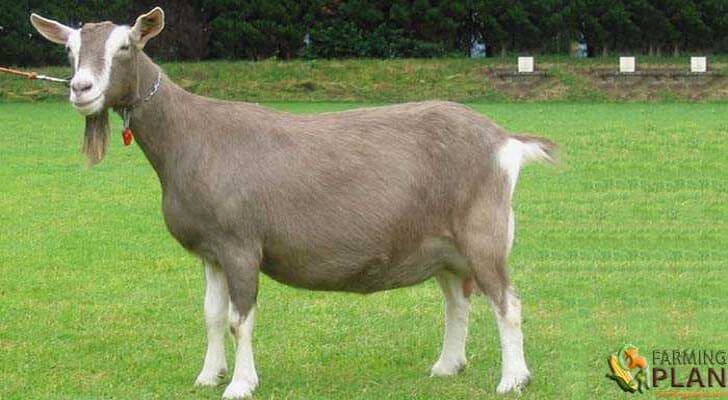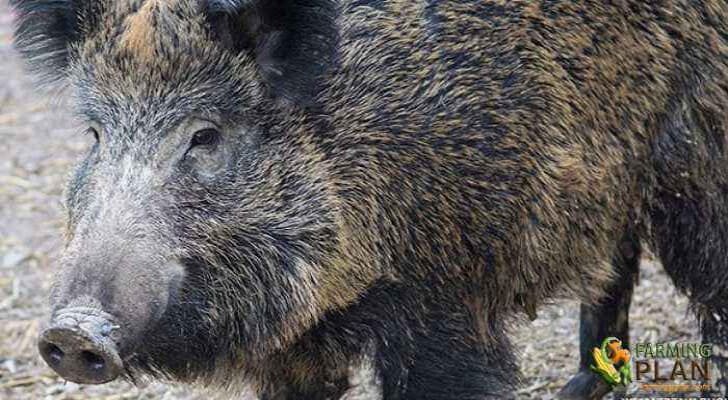I was utterly enchanted the first time I laid eyes on a Toulouse Goose. With their silky feathers, quiet demeanor, and inquisitive eyes, they immediately became my favorited farm feature. I never thought I would find a goose so gentle and easy to get along with. It was one of the most rewarding, and I suppose I must also say surprising, experiences of my life to raise a Toulouse Goose—and I have to tell you why I believe they could just as easily be your ideal addition to your homestead, too. If you’re searching for that serene, friendly barnyard friend, look no further than the Toulouse Goose.

History & Origin of Toulouse Goose
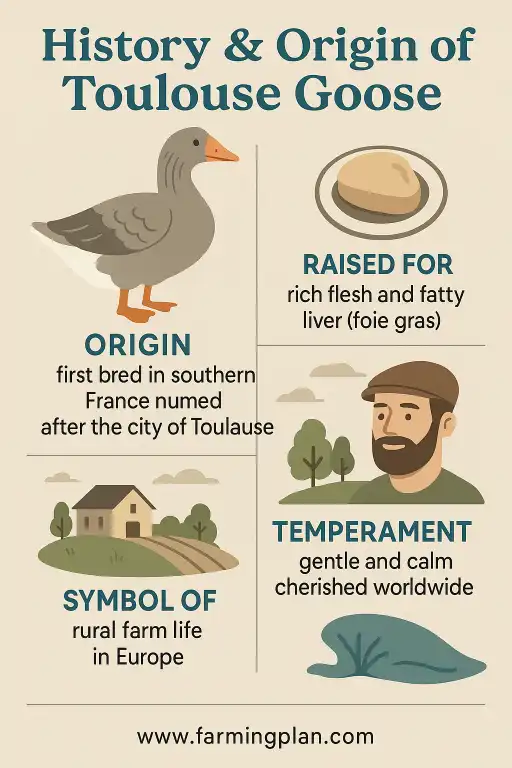
The Toulouse Goose has a history dating back to the farms of southern France, from where it was first bred centuries ago. It takes its name from the city of Toulouse and was first raised for its rich flesh and fatty liver, especially for foie gras. Farmers soon liked these geese due to their utility, nature, and striking appearance.
In Europe, the Toulouse Goose symbolized rural farm existence and was often seen waddling contentedly across green pastures. Today, they’re cherished by hobby farmers and pet owners around the globe because of their gentle temperament and strong identification with a rich agricultural history. Toulouse Geese were explicitly valued in the medieval and Renaissance periods when they were raised essentially for the market for luxury food, and the aristocracy greatly desired their flesh size and quality.
However, apart from their monetary worth, Toulouse Geese are also part of French cultural heritage since they are typically seen on rustic, picturesque farm vistas. Their stately, unhurried movements and gentle nature have endeared them to families looking for more than functional farm livestock—they’ve become emblems of peace, resilience, and the country’s spirit.
Today, the Toulouse Goose is no longer just a farm animal. It has earned its place as a beloved companion to many homesteaders, and its gentle temperament makes it a favorite among animal lovers worldwide. Whether part of a commercial farming operation or cherished as pets, Toulouse Geese continue to inspire affection and respect from those who encounter them.
Reads More: Jersey Giant Chicken: The Best American Heritage Breed
Characteristics of Toulouse Goose
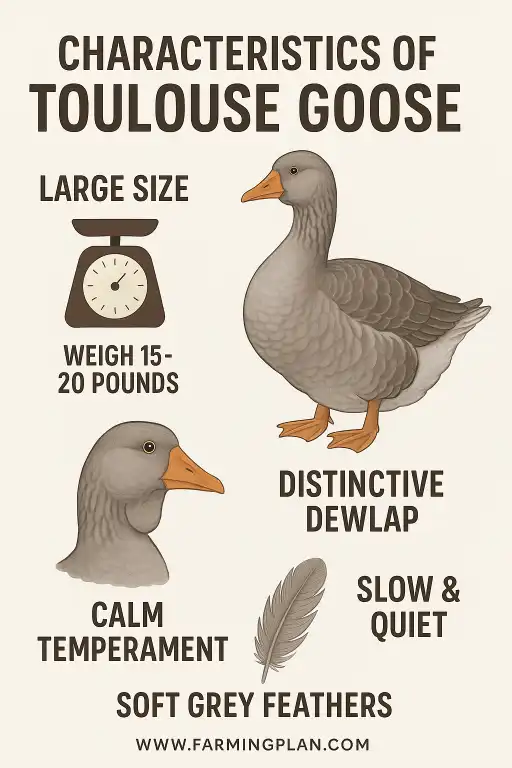
The Toulouse Goose is not easy to miss with its prominent, rounded figure, soft grey feathers, and distinctive dewlap—a loose flap of skin beneath its chin. They typically weigh 15 to 20 pounds, although some will grow larger if well-fed and cared for. Their calm gaze and thick, puffy feathers give them a relaxed, cuddly air that’s as cute in the flesh as it is on camera.
Unlike more energetic or boisterous breeds, Toulouse Geese walk slowly and quietly. They’re simple to spot by their size and quiet nature. Whether you reside on a busy farm or a calm backyard, they fit in well in various areas as long as they have space and fresh water. Their refined presence is a hint of serenity wherever they are, and they’re content grazing fields as they are ambling around your backyard.
Toulouse Geese range in color to grey, and a few slightly differ in feather design. They possess soft, plush feathers that give them an air of elegance and a sense of near regality, and their substantial size gets them noticed wherever they go. Whether munching on newly-cut grass or lumbering about their pen, their tranquil character and soft appearance will never fail to draw the eye. Toulouse Geese are a true joy to watch, and they add a touch of character and affection to any farm yard.
The Toulouse Goose is a remarkable breed known for its unique characteristics and historical significance. Originating in France, this breed has become a valuable asset to farmers, breeders, and pet owners worldwide. Renowned for its large size, gentle temperament, and distinctive features, the Toulouse Goose is an excellent choice for meat and egg production. Its history dates back to the 19th century when it was initially bred for its meat, particularly the famous “foie gras.” The Toulouse Goose offers economic benefits for farmers and breeders and is an interesting breed to raise, thanks to its hardy nature and relatively low maintenance needs.
“Their dense, soft down is perfect for making luxury bedding and warm clothing, offering another income stream for farmers.”
Nature and Behavior: What’s Their Personality Like?
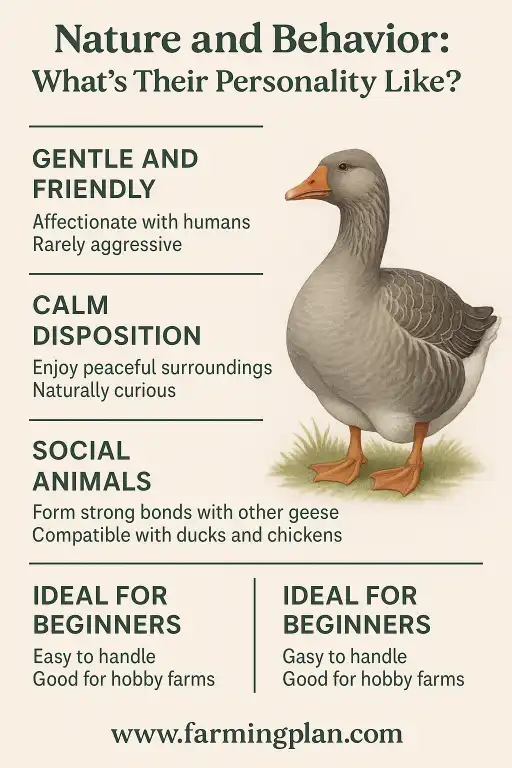
Toulouse Goose is also renowned for being one of the most relaxed and easy-going breeds of geese available. They’re affectionate with humans, get along with other farm animals, and are scarcely ever hostile. This renders them a family favourite with kids or anyone starting with keeping geese. Whether you’re lounging with your geese in the backyard or sitting back to watch them stroll happily along the waters’ edge, their easy nature is relaxing.
They adore serene surroundings, are naturally curious, and waddle over simply to investigate what you’re doing. Toulouse Geese thrive in peaceful surroundings where they can relax and feel pampered. Whether grazing on a lush lawn or sleeping in the sunny corner of the barn, their gentle disposition makes them a joy to be around.
Toulouse geese are highly social animals and love to be in the company of other geese. They will become firmly attached to their flock members and are wonderful friends to other birds like ducks, chickens, and even turkeys. Keeping two or three geese is advisable since they love to be among their flock and are much happier when not solitary.
If you are a beginner who wants to raise geese, the Toulouse Goose is an ideal breed. They are gentle, which makes them perfect for hobby farmers, families, and even city homesteaders who want a peaceful, easy-to-care-for companion. They are extremely friendly and are not shy about being handled. They will welcome you when they notice you enter their space, asking for a head pat or attention.
Reads More: American Buff Goose: 7 Expert Tips for Care & Success
Feeding the Toulouse Goose: What They Truly Need
A well-fed Toulouse Goose starts with nutritious food. They should be given fresh grasses, leafy greens, and grains like oats, wheat, or corn every day. You can also provide them with quality waterfowl pellets to ensure they get all the necessary vitamins and minerals. Because Toulouse Geese naturally like to graze, they can be fed clover, grass, and other greenery, which makes them an ideal choice for anyone practising organic farming or sustainable living.
Don’t feed them anything mouldy, salty, or processed—these will upset their stomachs and cause illness. Goslings need starter food with protein added, and the adults love a mix of grains and greens. Ensure fresh water is in front of them, especially at meal times, to help digest and keep them hydrated. In addition to their regular diet, you may supplement their feeding with kitchen waste in the form of lettuce, carrots, or vegetable trimmings. These nutritious supplements will introduce variety into their diets and prevent waste from piling up at your home.
How the Toulouse Goose Helps: From Pets to Profits
The Toulouse Goose is not just a pretty face but also incredibly useful around the homestead. Many people keep them as sweet companions; some grow them for succulent meat, large eggs, or breeding purposes. They are so gentle that they’re a cinch to work with, even for beginners. Toulouse Geese are one of the best-producing meat breeds out there because of their large size and intense flavour, which make them a world-favourite kitchen staple.
They thrive in sustainable farm conditions by controlling weeds and bugs as they graze naturally. Their manure is also perfect garden compost. Toulouse Geese are also excellent foragers and may be utilized to rid your property of unwanted pests like snails, slugs, and grasshoppers. Some even hobbyists enjoy training Toulouse Geese for show or simply keeping them as pets due to their friendly nature. Whether you want a loyal backyard friend or a loyal farmhand, this bird truly does it all.
7 Powerful Reasons
Raising Toulouse Geese has numerous benefits that make them an ideal choice for farmers and pet owners. Here are seven powerful reasons to raise these majestic birds:
- Gentle Temperament: Toulouse Geese are known for their calm and friendly nature, making them excellent companions for families and pet enthusiasts. Their relaxed attitude makes them easy to handle and bond with.
- Versatile Use: Whether you’re interested in raising them for meat, eggs, or simply as pets, Toulouse Geese offers incredible versatility, serving multiple purposes on your homestead.
- High-Quality Meat: Toulouse Geese are prized for their rich, flavorful meat, which is perfect for gourmet dishes and high-end culinary uses like foie gras. Thus, they are a valuable addition to any farm.
- Sustainable Farming: They are excellent foragers, helping you manage weeds and pests naturally. Their manure is also a wonderful addition to your compost, making them an asset to sustainable farming.
- Low Maintenance: Toulouse Geese are relatively easy to care for, requiring simple living conditions and regular feed, which makes them an excellent choice for beginners.
- Aesthetic Appeal: With their soft grey feathers and distinctive dewlap, Toulouse Geese add a touch of elegance and beauty to any farm or backyard.
- Long Lifespan: With proper care, these geese can live for up to 22 years, meaning they’ll be a long-term addition to your homestead, offering years of companionship and service.
Step-By-Step Guide for Farming
Step 1: Providing a Safe and Comfortable Place to Roost
Begin with a dry, draft-free shed or coop that has proper ventilation. Geese are tough birds, but they do require protection from harsh weather. Ensure the area is predator-proof to ensure that unwanted visitors don’t show up. Ensure the coop gives each goose room to exercise freely, with at least 2 to 3 square feet per goose. Use straw or wood shavings as bedding and ensure it’s always kept dry.
Step 2: Creating a Feeding and Water Station
Place shallow, clean food and water bowls. Provide fresh water to geese at all times—geese need this to help them swallow and digest their food. Create a watering system that keeps their water clean since geese tend to dirty it quickly.
Step 3: Creating a Daily Routine
Feed twice daily, check water levels, and clean the coop regularly. During your daily walk-through, look for illness or injury. Check their feet regularly for signs of bumblefoot or other foot problems. Toulouse Geese are generally very healthy, but good care will prevent problems from getting out of hand before they become significant issues.
Step 4: Handling and Bonding with Them
Spend time near your geese, whisper, and feed them treats by hand. Toulouse Geese are handled gently and can grow incredibly attached to you. The more time you spend with them, the more they imprint on you and become easier to look after and train.
Step 5: Breeding and Raising Young
Provide a quiet nesting area in spring. If breeding, inspect eggs and give goslings warm shelter and starter feed with supplemental protein. Ensure the goslings are warm and have a sufficient fresh food and water supply.
Step 6: Seasonal Care Tips (Winter/Summer)
In winter, dry bedding and extra hay for warmth. In summer, shade and cool water are used daily to prevent overheating. Toulouse Geese are sturdy, but like all creatures, they will appreciate protection in severe weather.
Common Health Issues & Prevent
Like any other animal, the Toulouse Goose can be subject to some illness, but proper care will prevent many of the common diseases they may catch, and how to prevent them will help ensure your geese live a healthy and long life.
Common Illnesses
Foot Ailments: Geese and the Toulouse, too, can get bumblefoot, a painful bacterial infection of the foot that develops if they are kept in dirty or moist environments. Left untreated, bumblefoot leads to swelling, lameness, and infection, so their feet must be inspected meticulously on a regular basis.
Prevention: Ensure the surface on which they walk and rest is dry and clean. Check their feet for cuts, swelling, or scabs regularly and immediately treat any indication of infection. In the event of suspected bumblefoot, isolating the infected goose and consulting a veterinarian for treatment advice is recommended.
Respiratory Infections: Toulouse Geese, like other waterfowl, can be infected with respiratory infections because of cold, damp, or drafty environments. If left untreated, respiratory infections can develop into pneumonia.
Prevention: Provide dry, draft-free housing with adequate ventilation. Please do not leave your geese in damp or cold conditions for an extended duration, as this can weaken their immune systems and make them susceptible to respiratory disease. Sanitize the area around food and water bowls since dirty conditions also make geese susceptible to respiratory disease.
Parasites: Worms, mites, and other parasites external to geese are common in geese with open fields or access to water bodies. Even though the parasites may not always be visible, they can lead to severe health conditions if not treated.
Prevention: Check your geese often for parasites, particularly during moulting. Check your skin thoroughly if you see signs of feather loss, scratching, or skin irritation. You may work with a veterinarian to provide preventative treatment for worms and mites. Clean living conditions and fresh water are also essential because dirty living environments are breeding grounds for parasites.
Leg and Joint Problems: Geese, particularly bigger geese such as the Toulouse, sometimes suffer from joint disease or leg problems like arthritis or hip dysplasia. This could be brought about by overweight or unfavourable conditions restricting their mobility.
Prevention: Provide your geese with sufficient space to move freely to minimize the risk of joint issues. Overfeeding or low-quality foods that lead to obesity can also strain their joints. A nutritionally balanced diet with all nutrients, including calcium, will ensure strong bones and joints.
Signs to Look Out For
- Lethargy: Should your Toulouse Goose be uncharacteristically lethargic or tired, illness could be a sign.
- Limping or Swelling: Any visible lump or swelling in the legs or feet could indicate foot infections or joint issues.
- Coughing or Wheezing: This could indicate respiratory issues if accompanied by a runny nose or loss of appetite.
- Feathers Without Luster or Draws Dirt: Poor feathers may indicate poor diet, disease, or parasites.
- Excessive or Loose Droppings: Dull or coloured droppings may indicate digestive dysfunction, internal parasites, or infection.
Preventive Care Routine
The most effective way to prevent common ailments with your Toulouse Geese is a regimen of caring for them. This is how you can set yourself ahead of time on possible issues:
Grooming: Inspect your geese regularly for any indication of illness, and groom them by removing dirt or debris from their feathers. This also means inspecting their feet and beaks for signs of bumblefoot or other infections.
Vaccinations: Work with your veterinarian to keep your geese up to date on needed vaccinations. Vaccinating your geese will eliminate diseases that could otherwise affect their health and productivity.
Hygiene: Keep their living environment clean by frequently changing bedding, washing food and water dishes, and sanitizing the coop. This prevents disease and parasite infestation, as well as respiratory disease and other illnesses.
Adequate Nutrition: A balanced diet that meets all their dietary needs is key. Make sure you supply them with an assortment of good-quality grains, greens, and clean water. A varied diet also ensures that they get all the vitamins and minerals they need to keep their immune systems healthy.
Parasite Control: Perform regular parasite screening and, as needed, provide preventatives. Several commercial products are available but check with your veterinarian before adding any treatment to your flock to be sure it is safe for them.
When to Call the Vet
It’s always a good idea to be alert and realize when to call a professional. If you notice any persistent symptoms like loss of appetite, stiffness, or strange behaviour, it’s time to call a vet. Early intervention will prevent more complex problems, so don’t wait to receive professional treatment if you’re uncertain about your goose’s health. On-time treatment is essential in preventing the spread of disease and maintaining your Toulouse Goose healthy and cheerful.
Bringing It All Together: Why the Toulouse Goose Belongs With You
Raising a Toulouse Goose brings peace and joy to any farm or backyard. Their gentle nature, unique appearance, and low-maintenance care make them an ideal choice for both experienced farmers and beginners. Whether you’re seeking a companion for your homestead or a reliable helper for your sustainable farming practices, these geese are a perfect fit.
Don’t worry if you’re inexperienced with raising geese—Toulouse Geese are easy-going, friendly and relaxed, so the experience is rewarding and fun. They’ll flourish under a bit of attention and care and smile at you every day. So why wait? Take the first step today and welcome a Toulouse Goose into your life—you won’t regret it! Whether you’re a family looking for a gentle pet or a farmer needing reliable, low-maintenance livestock, the Toulouse Goose will surely become a cherished part of your home.
Seasonal Care Tips: Keeping Your Toulouse Goose Comfortable Year-Round
As with any other animal, Toulouse Geese have varying needs based on the seasons. Knowing their seasonal needs will ensure they remain healthy and content regardless of the weather. Whether it is the winter chill or the summer heat, giving them the proper care for your geese during the seasons is necessary.
Winter Care: Keeping Them Warm and Cozy
Although Toulouse Geese are robust birds, they also require special attention in the winter to remain warm and healthy. This is how to prepare them well for the winter:
Dry Bedding: Humidity is one of the worst dangers to your geese’s health during winter. Cold, wet bedding can freeze the geese and risk bringing respiratory illnesses or foot problems. Make sure they have enough dry material, like straw or wood shavings, in their cover for insulation. Replace the bedding periodically so that it does not get wet or dirty. Their home must be draft-free but well-ventilated. Geese can contract respiratory illness from cold drafts, and their drafts will also worsen any sickness. Their home needs to be wind-protected, but don’t seal it so that there is no airflow. Good airflow is required to avoid condensation buildup and the ensuing damp atmosphere.
Additional Heat: Toulouse Geese do not generally require heat lamps, but in situations where temperatures drop well below freezing, added heat can be helpful. A safe, energy-efficient heat source like a ceramic heater (never a heat lamp) will help keep your geese cosy without the risk of fire.
Fresh Water Supply: Water can also freeze rapidly during cold weather, so it is necessary to provide a system by which your geese always have fresh water. Some suggestions include using heated water bowls or automatic waterers that won’t freeze. Geese require free access to fresh water, both for drinking purposes and to help digest food.
Your Toulouse Geese may need extra food in colder weather to maintain their body heat and energy levels. Feed them a healthy diet with the right carbohydrates, protein, and fat balance. Supplement their diet with extra grains or high-quality waterfowl pellets to keep them well-fed in cold weather.
Watch for Frostbite
Toulouse Geese also have a dewlap (sagging area of skin hanging from the lower chin) that can be frosted if it is very cold. If you notice swelling or dark-colored spots on the dewlap or feet, it could be evidence of frostbite. Rub their feet softly with a non-medicated lotion and place them in a safe, warm spot to prevent more damage.
Summer Care: Making Them Cool and Hydrated
During summer, the emphasis changes from warmth to cooling and hydrating your Toulouse Geese. The following are some guidelines for taking care of them during the hot summer months:
Shade and Shelter: Toulouse Geese enjoy outdoor time but require adequate shade on hot days to prevent overheating. Offer a shaded space, e.g., a tree, tarp, or covered section in their pen, for them to take refuge from the sun. Heat stress can happen to geese, so providing them with a cool place to retreat is essential.
Water Access: Toulouse Geese are waterfowl that love to swim and wade in water. Although they do not require a pond, access to a kiddie pool or shallow water trough can help cool them down and satisfy their instincts. Ensure their water is replenished regularly to prevent contamination by algae or debris.
Prevent Overcrowding:In summer, Toulouse Geese enjoy spending most of their time outside, feeding on fresh grass and enjoying the sun. Crowding in their shelter or pen can cause discomfort and stress. Please provide them with sufficient space to move around and live in an environment that is spacious enough for their needs.
Hydration: When it is warm, geese will consume large amounts of water, so make sure that you have enough. They may consume several litres daily, especially if they are energetic and foraging. Besides their usual water sources, try to position extra water dishes around the property and ensure the water is clean and fresh.
Pest Control: Summer might usher in more insects, such as mosquitoes, flies, and ticks, which can affect your Toulouse Geese’s well-being. Consider using herbal pest repellents, such as garlic or citronella, to help ward off bugs. Ensure that their roosting place is sanitized and their surrounding environment is fly-free and free of droppings regularly.
Seek out Dehydration: Dehydration is a real concern in the heat. Check your geese regularly for signs of dehydration, such as excessive panting or a lack of energy. Also, keep a close eye on their water intake and ensure they’re getting enough to drink.
Grooming During Summer: Toulouse Geese moult during summer, and if not groomed properly, they can be exposed to heat stress. Regular grooming will keep them comfortable, remove excess feathers, and prevent entanglement in matted feathers. Be sure to check their feathers for any pests or injuries.
Spring and Fall Care: Transitioning Seasons
While winter and summer require the most care, transitioning from spring to autumn (or fall to spring) also presents challenges. Geese are apt to moult during those times of the year, making them more vulnerable to temperature fluctuations.
Spring Molt: During spring, geese shed feathers or moult and grow new ones. This makes them vulnerable to the outside environment, so be cautious when observing their enclosures and providing insulation or cooling them, as the case may be, depending on the weather.
Fall Feather Loss: In the fall, geese initiate their moult for cold weather. During this period, Toulouse Geese shed more feathers than usual, making them more vulnerable to cold. Provide them with extra bedding and give them a warm and dry area in which they can escape.
FAQ
How long do Toulouse geese live?
Toulouse geese usually survive 10 to 22 years, relying on their habitat and care.
Are Toulouse geese friendly?
Yes, Toulouse geese are friendly and relaxed and become wonderful pets for families and weekend farmers.
What do Toulouse geese graze on?
Toulouse geese mainly subsist on grasses, cereals, green leaves, and top-end waterfowl pellets.
Do Toulouse geese require a pond?
Although they adore water, Toulouse geese do not need a pond but freshwater access daily.
How many eggs can a Toulouse goose lay per year?
Toulouse geese typically lay 20 to 35 eggs annually, depending on their breeding conditions and general health.
Conclusion
Caring for your Toulouse Goose is an enriching experience, whether looking for a friendly companion or a reliable farm animal. With a gentle nature and low-maintenance care, these geese make excellent pets and farm helpers. Understanding their seasonal needs ensures they stay comfortable, healthy, and happy year-round. Your Toulouse Goose can live a long, fulfilling life with the right care, a balanced diet, and proper shelter. Your effort into maintaining their health will be reflected in their calm demeanor, stunning appearance, and overall happiness.

